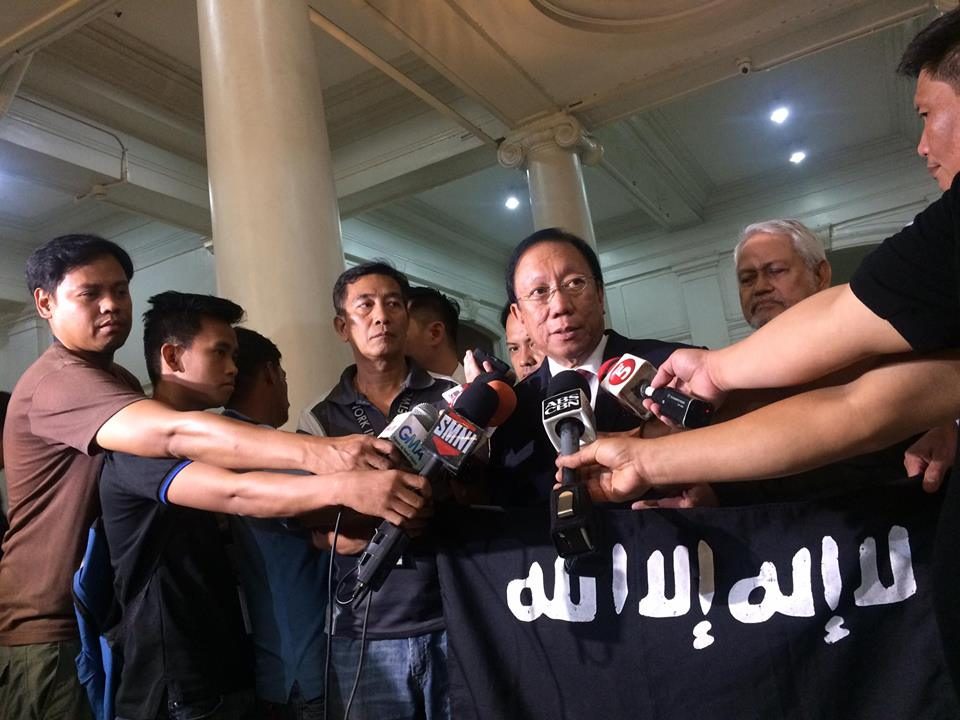SUMMARY
This is AI generated summarization, which may have errors. For context, always refer to the full article.

MANILA, Philippines (UPDATED) – Solicitor General Jose Calida on Monday, June 19, said there are 20 Islamic State (ISIS) cell groups operating all over Mindanao, conducting coordinated attacks with local terror groups like the Maute.
Calida listed down the ISIS cells in his memorandum filed with the Supreme Court (SC) on Monday to supplement the government’s defense of President Rodrigo Duterte’s declaration of martial law:
- Ansar Dawiah Fi Filibbin
- Rajah Solaiman Islamic Movement
- Al Harakatul Islamiyah Battalion
- Jama’at Ansar Khilafa
- Ansharul Khilafah Philippines Battalion
- Bangsamoro Justice Movement
- Khilafah Islamiya Mindanao
- Abu Sayyaf Group (Sulu faction)
- Syuful Khilafa Fi Luzon
- Ma’rakah Al-Ansar Battalion
- Dawla Islamiyyah Cotabato
- Dawlat Al Islamiyah Waliyatul Masrik
- Ansar Al-Shariyah Battalion
- Jamaah al-Tawhid wal Jihad Philippines
- Abu Dujanah Battalion
- Abu Khubayn Battalion
- Jundallah Battalion
- Abu Sadr Battalion
- Jamaah Al Muhajirin wal Anshor
- Balik-Islam Group
According to Calida, the cell groups combine forces with 4 major ISIS-inspired groups – the Maute, Abu Sayyaf from Basilan led by Isnilon Hapilon, Ansarul Khilafah Philippines (AKP), and Bangsamoro Islamic Freedom Fighters (BIFF).
“These ISIS-linked local rebel groups and ISIS cell groups have conducted violent activities, particularly in the areas of Basilan, Sulu, Tawi-Tawi, Zamboanga, and Davao, not merely to sow terror amongst the populace, but to dismember the country. They have the capability of conducting bomb attacks in any areas of Mindanao,” the Solicitor General said.
But Defense Secretary Delfin Lorenzana said the 4 major ISIS-inspired groups are the “only significant grouping that create mischief like that of Marawi.”
“The others have been degraded to almost an insignificant number. [But] they can still recruit and become a grave threat, [so] we will also target them for neutralization as they may merge with other groups to become bigger,” Lorenzana told Rappler.
Lorenzana added: “Except for the Maute we are dealing with right now, the others are under control and not cause for panic.”
Calida said a meeting was supposed to take place in the first week of 2017 among the 4 ISIS-inspired rebel groups to declare their unified pledge to ISIS, but they were preempted by the death of AKP leader Mohammad Jaafar Maguid or Tokboy.
Lorenzana announced in January 2017 that the ISIS leadership had made direct contact with Hapilon to instruct him to find a suitable area in Mindanao where they could establish an ISIS caliphate.
Lorenzana said then that Hapilon was considering the area of Central Mindanao and was trying to get the support of the Maute Group. Marawi City in Lanao del Sur is in Central Mindanao.
Intel on ISIS
Calida had also previously revealed, supported by the admission of the ground commander in Marawi City, that the Armed Forces of the Philippines (AFP) knew as early as April that Maute had deployed its members to plot the attack in Marawi.
Ground commander Major General Rolando Bautista said they were waiting for the Maute brothers to make a move, but were surprised to learn that Hapilon was also in the city, triggering the clashes that will enter their 5th week Tuesday.
At the Shangri-La Dialogue Security Summit in Singapore on June 4, Defense Undersecretary Ricardo David said there were “250 to 400” ISIS fighters in the country.
But David’s estimates were starkly different from the figures provided by his Indonesian counterpart, who pegged the number of ISIS fighters in the Philippines at 1,200.
“There are 1,200 ISIS in the Philippines, around 40 from Indonesia. This information I will inform to our counterparts in ASEAN,” Indonesian Defense Minister Ryamizard Ryacudu said, citing regional intelligence.
SC justices wanted to determine, during the 3-day oral arguments on the anti-martial law petitions last week, if there was failure of intelligence in Marawi. The magistrates agreed to be briefed privately by Lorenzana, AFP chief General Eduardo Año, and other key security officers.
Lorenzana told Rappler that the interpellation by the justices brought out highly classified details, which they would not want the public to know.
“Aren’t we the ones who get to decide which information is classified? Remember, our troops are still fighting and dying in Marawi… As it is we have already made public more than the public should know,” Lorenzana told Rappler through a text message. – Rappler.com
Add a comment
How does this make you feel?
There are no comments yet. Add your comment to start the conversation.